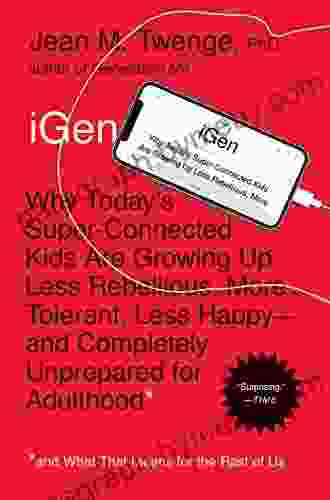Why Today's Super Connected Kids Are Growing Up Less Rebellious, More Tolerant

In an era marked by rapid technological advancements, our children navigate a digital landscape that was unimaginable just a few decades ago. With nearly constant access to the internet, social media, and mobile devices, they belong to a generation that is "always connected." This hyper-connectivity has sparked concerns and debates about its potential impact on their development.
4.5 out of 5
| Language | : | English |
| File size | : | 48391 KB |
| Text-to-Speech | : | Enabled |
| Screen Reader | : | Supported |
| Enhanced typesetting | : | Enabled |
| X-Ray | : | Enabled |
| Word Wise | : | Enabled |
| Print length | : | 533 pages |
Conventional wisdom often portrays super connected kids as rebellious, isolated, and lacking social skills. However, groundbreaking research conducted by sociologists at the University of Pennsylvania challenges these preconceptions and reveals a surprising truth: today's super connected kids are growing up less rebellious and more tolerant than previous generations.
The Study: Unraveling the Disconnect
Led by Professor Jean M. Twenge, a leading expert in generational differences, the study analyzed data from over 11 million American adolescents and young adults born between 1976 and 2012. This comprehensive study examined a wide range of variables, including parental monitoring, peers, and social media use, to understand the relationship between technology and adolescent behavior.
The findings were striking. Contrary to popular belief, the study showed that super connected kids are actually less likely to engage in risky behaviors compared to their less connected peers. They are less prone to binge drinking, underage smoking, and drug use. Additionally, they demonstrate higher levels of empathy and tolerance towards people from different backgrounds and cultures.
The Mediating Role of Social Media
A key finding of the study attributes this shift to the mediating role of social media. Contrary to the common perception of social media as an isolating force, the study revealed that it can foster social connections and promote positive interactions among youth.
Social media platforms provide teens with opportunities to engage with friends, explore their identities, and connect with like-minded individuals regardless of their physical location. These virtual communities can create a sense of belonging and provide a platform for dialogue and discussion.
Moreover, social media exposes teens to diverse perspectives and experiences, fostering greater understanding and respect for different cultures and lifestyles. By engaging with people from all walks of life, super connected kids develop a more nuanced understanding of the world and become more empathetic towards others.
Parental Influence: Balancing Boundaries with Guidance
While technology undoubtedly plays a significant role, the study also highlights the importance of parental influence. Effective parenting can help mitigate potential risks associated with excessive screen time and promote a healthy relationship with technology.
Parents who set clear boundaries, encourage face-to-face interactions, and promote healthy digital habits can help their children reap the benefits of technology while minimizing potential drawbacks.
Engaged parenting involves open dialogue about internet safety, privacy, and digital etiquette. It also entails monitoring children's online activities, not to restrict them, but to guide them and provide support in navigating the digital world.
Embracing the Digital Revolution: A Call for Realignment
The findings of this groundbreaking study challenge societal biases about the impact of technology on youth. Instead of being a source of rebellion and isolation, technology can empower young minds, foster tolerance, and promote positive social development.
It is imperative to recognize the changing nature of childhood and adolescence in the digital age. By embracing the positive potential of technology and adapting our parenting strategies accordingly, we can harness its power to raise a generation of well-rounded, compassionate, and tolerant individuals.
: Nurturing Resilience in a Connected World
Today's super connected kids are not the rebellious, isolated youth that stereotypes often depict. On the contrary, they are growing up to be less rebellious, more tolerant, and more empathetic than previous generations.
As we continue to navigate the digital landscape, it is essential to embrace a nuanced understanding of technology's impact on youth development. By fostering a healthy balance between online and offline experiences, encouraging parental guidance, and recognizing the positive potential of social media, we can nurture a generation of resilient, digitally savvy individuals who are equipped to navigate the complexities of the modern world.
For further insights into this groundbreaking research, we highly recommend exploring the book "iGen: Why Today's Super Connected Kids Are Growing Up Less Rebellious, More Tolerant, Less Happy -- and Completely Unprepared for Adulthood" by Professor Jean M. Twenge, available now at your favorite bookstores and online retailers.
4.5 out of 5
| Language | : | English |
| File size | : | 48391 KB |
| Text-to-Speech | : | Enabled |
| Screen Reader | : | Supported |
| Enhanced typesetting | : | Enabled |
| X-Ray | : | Enabled |
| Word Wise | : | Enabled |
| Print length | : | 533 pages |
Do you want to contribute by writing guest posts on this blog?
Please contact us and send us a resume of previous articles that you have written.
 Book
Book Novel
Novel Page
Page Chapter
Chapter Text
Text Story
Story Genre
Genre Reader
Reader Library
Library Paperback
Paperback E-book
E-book Magazine
Magazine Newspaper
Newspaper Paragraph
Paragraph Sentence
Sentence Bookmark
Bookmark Shelf
Shelf Glossary
Glossary Bibliography
Bibliography Foreword
Foreword Preface
Preface Synopsis
Synopsis Annotation
Annotation Footnote
Footnote Manuscript
Manuscript Scroll
Scroll Codex
Codex Tome
Tome Bestseller
Bestseller Classics
Classics Library card
Library card Narrative
Narrative Biography
Biography Autobiography
Autobiography Memoir
Memoir Reference
Reference Encyclopedia
Encyclopedia Jim Burns
Jim Burns Alphonse Daudet
Alphonse Daudet Matthew Gabriele
Matthew Gabriele Jennifer Vavricka
Jennifer Vavricka Jim Cramer
Jim Cramer Ling Lee
Ling Lee John Henderson
John Henderson Robert F Moss
Robert F Moss Jeffrey Archer
Jeffrey Archer Jeff Lowenfels
Jeff Lowenfels Linea Johnson
Linea Johnson Yomi Adegoke
Yomi Adegoke Kiana Danial
Kiana Danial Henry Freeman
Henry Freeman Michael Hausenblas
Michael Hausenblas Pam Johnson Bennett
Pam Johnson Bennett Markus S Agerer
Markus S Agerer Shanta Kumar
Shanta Kumar Melissa Reynolds
Melissa Reynolds Jeffrey Ebbeler
Jeffrey Ebbeler
Light bulbAdvertise smarter! Our strategic ad space ensures maximum exposure. Reserve your spot today!

 Michael SimmonsTwenty One Sewing Projects To Make For Little Girls: A Journey Into the Realm...
Michael SimmonsTwenty One Sewing Projects To Make For Little Girls: A Journey Into the Realm...
 Jason HayesUnraveling the Tapestry of Science and Society: An Exploration of "The Part...
Jason HayesUnraveling the Tapestry of Science and Society: An Exploration of "The Part...
 Mason PowellLost Tales of Ga'Hoole: Guardians of Ga'Hoole - An Enchanting Journey into...
Mason PowellLost Tales of Ga'Hoole: Guardians of Ga'Hoole - An Enchanting Journey into...
 Ernest PowellUnleash Your Inner Artist: A Comprehensive Guide to Crafting Stunning Floral...
Ernest PowellUnleash Your Inner Artist: A Comprehensive Guide to Crafting Stunning Floral...
 Forrest BlairBegin Your Digital Painting Journey with the Ultimate Guide: Beginner's Guide...
Forrest BlairBegin Your Digital Painting Journey with the Ultimate Guide: Beginner's Guide... Herb SimmonsFollow ·8.5k
Herb SimmonsFollow ·8.5k Esteban CoxFollow ·17.2k
Esteban CoxFollow ·17.2k Federico García LorcaFollow ·4.3k
Federico García LorcaFollow ·4.3k Pablo NerudaFollow ·14.2k
Pablo NerudaFollow ·14.2k Henry GreenFollow ·5.7k
Henry GreenFollow ·5.7k Hugh ReedFollow ·12k
Hugh ReedFollow ·12k William PowellFollow ·19.6k
William PowellFollow ·19.6k Stephen FosterFollow ·4.3k
Stephen FosterFollow ·4.3k

 Jeremy Mitchell
Jeremy MitchellUnveiling the Truth: The Captivating Saga of The Elephant...
Embark on a poignant journey through the...

 Marvin Hayes
Marvin HayesThe Day The World Came To Town: A Heartwarming Tale of a...
In the quaint...

 Hugh Bell
Hugh BellExplore the Avian Treasures of Wisconsin: A Review of...
Unveiling the Secrets of...
4.5 out of 5
| Language | : | English |
| File size | : | 48391 KB |
| Text-to-Speech | : | Enabled |
| Screen Reader | : | Supported |
| Enhanced typesetting | : | Enabled |
| X-Ray | : | Enabled |
| Word Wise | : | Enabled |
| Print length | : | 533 pages |







